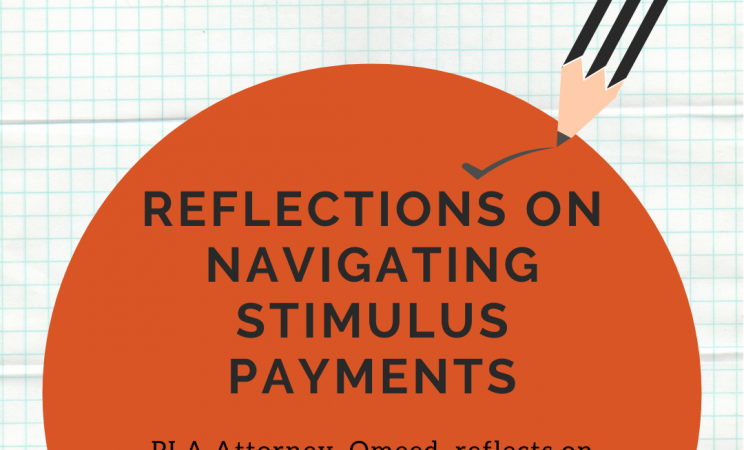Reflections on Navigating Stimulus Payments

Since the COVID-19 pandemic hit nearly a year ago, the nature of our work in the Taxpayer Support Clinic has been significantly altered. For our clients, their lives have significantly changed as well, as they face even more financial hardships. In response, the federal government has provided taxpayers with at least three critical rounds of stimulus in the form of direct IRS payments. As such, the Taxpayer Support Clinic and our clients have navigated a whole new program that can provide important support for people in this time of need.
Though the majority of our clients and taxpayers have successfully accessed stimulus payments, there have been various problems preventing some individuals from receiving them. For instance, with regard to the first round of payments from the CARES Act, if an individual's 2018 tax return information made them ineligible for the payment or ineligible for the full payment, they could not remedy this problem by filing a 2019 return. Similarly, if an individual's 2019 return filing had an issue that prevented the taxpayer from getting some or all of the payment, they could not remedy this problem with an amended 2019 return. The latter problem was also an issue that affected the second-round payments. The third round of stimulus payments, recently authorized by the American Rescue Plan Act, are poised to avoid this issue. Congress explicitly authorized the IRS to make “additional payment” when, for instance, a 2020 return is processed that makes a taxpayer eligible for more stimulus payment than they were eligible for based on their 2019 return. It remains to be seen if this new policy will be properly enacted.
We've also encountered problems that included: taxpayers being claimed, either with or without their knowledge, as dependents thus barring them from getting stimulus payments, taxpayers unable to access payments due to domestic violence, taxpayers not receiving supplemental payments for their children in a timely manner, and taxpayers' payments getting lost in the mail. Thankfully our unit has been able to assist clients with some of these issues.
We've had success in requesting refund traces for clients whose stimulus payments got lost in the mail or were intercepted by the wrong person. These taxpayers were so relieved when they got their much-needed money. We also have been able to help taxpayers correct clerical IRS-related administrative errors that prevented them from accessing some or all of their money.
Additionally, in cases where it was necessary, our own preparation of a client’s 2018 or 2019 return often helped them get on the record to get one or both stimulus payments. We've also been able to refer clients to the Campaign for Working Families for them to get 2018, 2019, and 2020 returns done so they can access stimulus payments. It is those moments that we are inspired by our clients' ability to identify the right resources and advocate for them effectively.
All too often, there are frustrating aspects of these payments that have been beyond our control. There is only so much we can do about the fact that so many taxpayers' 2019 return-related paperwork, for example, is still lingering in significant paper backlogs at the IRS. As such, some taxpayers have been unable to get payments they otherwise would've received based on 2019 return information. I have appreciated the opportunity to advocate for our clients on these issues during these extrordinary times.
The IRS can be a daunting agency to deal with for a lot of Americans. Taxes are complicated and the stimulus payments, administered through the tax system, are no exception. It has brought a smile to my face, in this difficult time, to be able to help so many Philadelphians answer questions about these payments or to help them access them in myriad ways. These payments have helped my clients pay off bills, like rent and utilities, and to provide basic necessities like food for themselves and their families. I feel blessed everyday that in this pandemic I have the opportunity to represent people in need through my work at PLA.